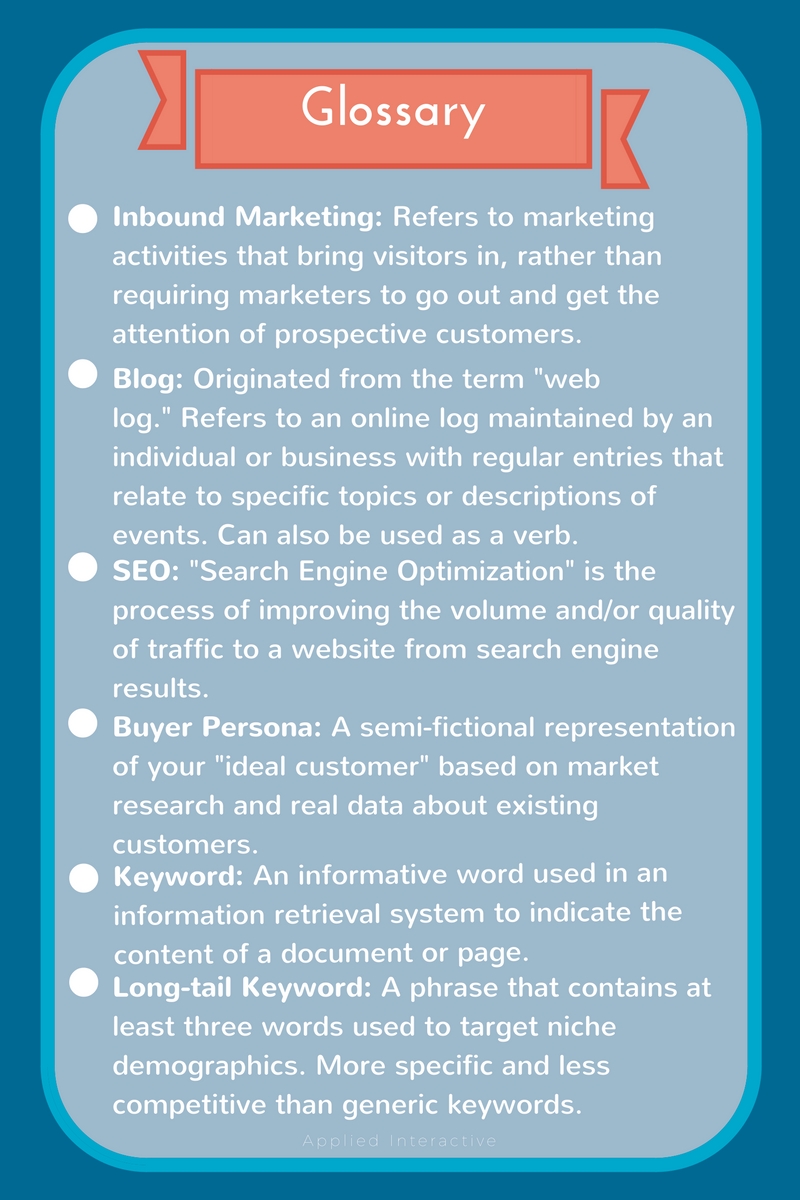Having the support and guidance of an experienced marketing agency is a great way to guarantee consistent, high-quality content, but it does not mean you should be uninvolved in your company’s marketing activities. Blogging is a great way to provide expert insight into your industry, and it’s no surprise that employees within a company are worth tapping for relevant blog content. Employees at all levels of the company should be encouraged to take part in the marketing process, especially if they can provide perspective and technical expertise for a complex or niche topic.
Do you want to start blogging but don’t know where to begin? Don’t waste your time guessing—use these easy tips to start writing blogs that will connect with your audience and bring in those leads!
Plan Your Blog Topic
 Every blog should start with a plan. Think about your audience.
Every blog should start with a plan. Think about your audience.
- Who are you trying to reach?
- What type of problems are they trying to solve?
- What kind of solutions can you provide?
These questions will help form the foundation of your buyer persona, or the ideal audience for your blog; your answers will help pinpoint the best blog topic for your company. Remember: The purpose of inbound marketing is not to advertise your product, but to provide potential customers with valuable information. Offering educational tips or insider perspectives unique to your knowledge and skillset is a great way to demonstrate your expertise and fortify trust with your customers.
Our blogs typically begin with a topic idea and a basic outline—something we refer to as an “SEO Blueprint.” This outline allows our team to organize the important information we’re trying to convey and keeps everything targeted for SEO. Our outlines include an attention-grabbing blog title and several subheadings (called H2s) that help block out the main points of our potential blog.
Using subheadings can also help make your blog more readable. Studies have shown that most Internet users prefer to skim online articles and pick out the most important points before they commit to seriously reading it. Subheadings will help your reader determine whether or not they want to keep reading. First impressions are crucial, so make sure you include keywords that are relevant to your chosen blog topic.
Produce Your Blog: Writing Tips
Now that you have your topic, a catchy title, and a blueprint for your blog, it’s time to tackle the hard part . . . actually writing it.
If corralling large groups of words into coherent sentences isn’t your strong suit, don’t panic. Even professional bloggers, journalists, and authors can have trouble putting their thoughts on paper. After all, there is always a lot of ground to cover and many different ways to frame the topic you’re covering.
 A great way to get started is to pool all of the relevant information you have on your subject into notes. This can include your thoughts on the topic as well as snippets of information you may gather from other sources. (Note: save every link you reference! Even if you don’t quote them directly, citing relevant, reliable sources will increase your credibility.) Start thinking about how you want to present your data. Bullet lists, block quotes with tips, and simple graphics are highly effective ways to break up long stretches of text and make your blog easier to comprehend quickly.
A great way to get started is to pool all of the relevant information you have on your subject into notes. This can include your thoughts on the topic as well as snippets of information you may gather from other sources. (Note: save every link you reference! Even if you don’t quote them directly, citing relevant, reliable sources will increase your credibility.) Start thinking about how you want to present your data. Bullet lists, block quotes with tips, and simple graphics are highly effective ways to break up long stretches of text and make your blog easier to comprehend quickly.
Once you’ve compiled a sufficient amount of raw data, start breaking it down into sections based on your subheadings. Breaking the data up into bite-sized chunks will help you process everything you want to write without becoming overwhelmed.
Remember: SEO is important, but you don’t need to be a slave to it. Google’s algorithms have advanced to the point that they can recognize relevant keywords on web pages and blogs; there’s no need for authors to repeat the same phrases over and over throughout a text. Start with a long phrase that summarizes your topic and its relevance to your customers (known as a long-tail keyword). Next, use your long-tail keyword to extrapolate related keywords and use them throughout your blog.
Publish Your Blog Online
You’ve written your blog. Great!
. . . Now what?
Before you get carried away showing off your new article to the world, make sure it has been edited. Have a grammar-savvy coworker check your work for readability, grammar, and spelling. If you have access to the folks at a marketing firm (like the talented group of social media marketers at Applied Interactive), this is the time to have their editing department look over your work and hone your SEO.
Once your blog has passed the grammar and SEO inspection, it’s time to publish! Your company site should include an appropriate location for these resources where they can be easily discovered by visitors, whether for blog pages, recent articles, white papers, or other content mediums. Your marketing team can ensure your blog is optimized, formatted, and posted for a clean, easy-to-read experience your audience will enjoy.
Promote Your Blog to the Right People
This step is frequently overlooked or underutilized, though managing the social media accounts for our clients is one of our most important tasks. Once a blog is published, we make sure it is posted to the client’s Twitter, Facebook, LinkedIn, Google+, and even Pinterest, with eye-catching captions to entice potential customers. We then send those links in an email to our employees and our client’s employees.
It is important to encourage every member of your organization to support your company’s social media! Did you draft a blog about the award your company just won for excellence in its field? Ask your peers to share the post and take part in spreading the word. Outside of paid advertising, social media is a community-based marketing strategy that benefits from word-of-mouth promotion. By asking the whole team to help in promoting relevant content on their social media profiles (both private and professional, when appropriate), you add momentum to your posts and demonstrate a company culture of unified pride.
Social media marketing is truly about providing valuable information that your potential customers can use. Who is better to talk about your industry and the services you provide than you?

